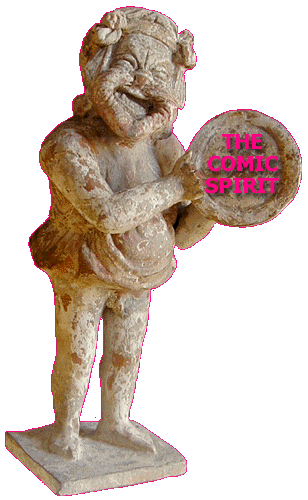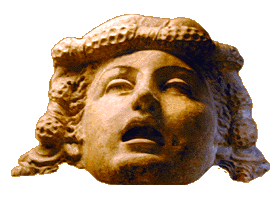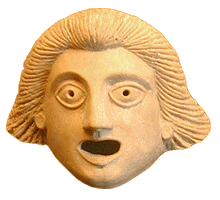
CLS 173 CDA The Comic Spirit (Aesthetics Category)

| Dr. Ann R. Raia, Associate Professor of Classics | Fall, 2002 |
| E-mail: araia@cnr.edu | Faculty Home page |
| Office: Castle 325 | Phone: Ext. 5398 |
| Office Hours: W 1:30-2:30, Th 11:30-12:30, and by appointment | Fax: (914) 654-5259 |
|
This course offers multiple experiences of comedy toward an exploration of the nature, form, and function of the literary genre Comedy. Reading and analysis of selected plays by Aristophanes, Plautus, and Terence will illustrate comic themes, techniques, and conventions found in later comedy. In search of a definition of comedy, criticism from Aristotle to Freud will be measured against reading, performance, and experience. |
Syllabus
Course Objectives and Learning Outcomes: at the conclusion of the course students will demonstrate--
Methods of Instruction:
Materials of Instruction:
Requirements: Students are expected to--
Grading:
Your grade will be based on the quality of your own work (see below *)
as follows:
* Students found cheating or plagiarizing will fail the course, as will
those who do not complete all course requirements
**those with more than four unexcused absences will find their grade
lowered in this category
*** make-ups will be arranged only for students who have medical or other
serious excuses
Course Policies:
Attendance and promptness are required: students with more than four
unexcused absences will find their grade lowered in this category; four
latenesses will be considered one unexcused absence. Appropriate class
behavior is expected. Un-excused late assignments will not be accepted.
Those who are absent or late are responsible for obtaining assignments,
notes, announcements, and hand-outs.
Make-ups will be arranged only for students who have medical or other
serious excuses, both of which must be reported through proper channels.
Students with documented special needs must inform the instructor at the
beginning of the course of accommodations or services they require for
successful academic participation.
| Schedule of Semester Topics |
|---|
| class meets Wednesday (Ch 210) & Friday (Ch 203), 12 to 1:15 pm |
| computer workshops will be arranged and announced |
| detailed daily assignments will be posted |
September 4: Distribution and Review of the Syllabus
September 6, 11, 13: Introduction to the Topic, the Questions, the
Course Methods
Reflecting on and sampling the wide range of comedy in contemporary
culture and your own experience of comedy, we will attempt to answer such
questions as:
Why do we laugh? What do we laugh at? Does laughter define comedy?
Have you got a sense of humor? Are you a creator or consumer of comedy? Is
comedy universal and timeless or is it culture -gender -experience
-specific? Where did comedy originate? What does comedy tell us about the
culture from which it arises? What is comedy’s function? What is its
relation to tragedy? Does comedy happen or is it constructed? Who are the
people of comedy? What is the dress of comedy? What are the actions of
comedy? Does comedy have its own language and methods? Where and when does
comedy take place?
September18-October 11: Domestic Comedy
October 11: Quiz 1
October 18-November 15: Comic Heroes
October 20: Class attendance at Aquila Theater Company's matinee performance of Shakespeare's Comedy of Errors on Broadway (see assignment)
November 5: Project 1: due via email to Dr. Raia
November 6: On-line review and critique of Project 1 in the
Mooney Center, Room 314:
Read your group's project first, then read the
scenes written by the other three groups. Complete, sign, and submit an
evaluation form, rating each scene and assessing its strengths and
weaknesses (summary of class critique):
| The Affair April, Roxanna, Shameika |
Pseudonipio Chauntea, Elaine, Kim |
| The Neighbor Kelly, Jennifer C. |
The Marriage Hassmerry, Isha, Jennifer P., Michelle |
Read the plot of the Greek New Comedy play The Girl From Samos, written by the playwright Menander, a predecessor of Plautus and Terence.
November 8: Video screening of A Funny Thing Happened on the Way to the Forum, in Mooney Center B 3, from noon-1:40 pm. In preparation for watching the play, read Eric Bentley's chapter on "Farce." (Click here for music, here for plot)
November 13: Read Terence's Phormio, using M. Charney's "7 Aspects of the Comic Hero" as a guide.
November 13-15: Quiz 2: Part I: Take-Home essays (2); Part II: In-class short answers
November 20-December 6: Comic Satire and Parody
November 20: Computer
Workshop #2, Project #2 Instructions
December 11-13: Project #2: Troupe Performances of --
December 11: Troupe Performances 1 and 2:
presentations of an adapted scene from ancient comedy,
in Romita Auditorium
December 13: Troupe Performance 3:
presentation of an adapted scene from ancient comedy, in
Romita Auditorium
Closing Conversations about Comedy: 12:45 pm,
Mooney Center Lounge, over refreshments
Monday, December 16: Comedy Portfolios due in Castle 325 by noon